MG411: NHS People Management Report, People Management in Healthcare
VerifiedAdded on 2022/11/25
|13
|3418
|180
Report
AI Summary
This report examines the critical people management challenges facing the UK's National Health Service (NHS), focusing on leadership, training and development, and talent management. It highlights issues such as staff shortages, poor pay, high workloads, and the increasing reliance on agency staff, which contribute to low morale and potential risks to patient care. The report delves into the importance of leadership in motivating and managing staff, emphasizing the need for recognition, rewards, and addressing the Maslow's hierarchy of needs. It also addresses the role of training and development programs in enhancing employee skills and improving healthcare service quality. Furthermore, the report analyzes the NHS's talent management strategies, including the 'Ward to Board' approach, and suggests improvements like providing flexible working conditions, addressing salary discrepancies, and attracting future talent. The report provides recommendations to improve leadership, training, and talent management within the NHS, aiming to reduce staffing costs, improve patient care, and create a more supportive and effective work environment for healthcare professionals.
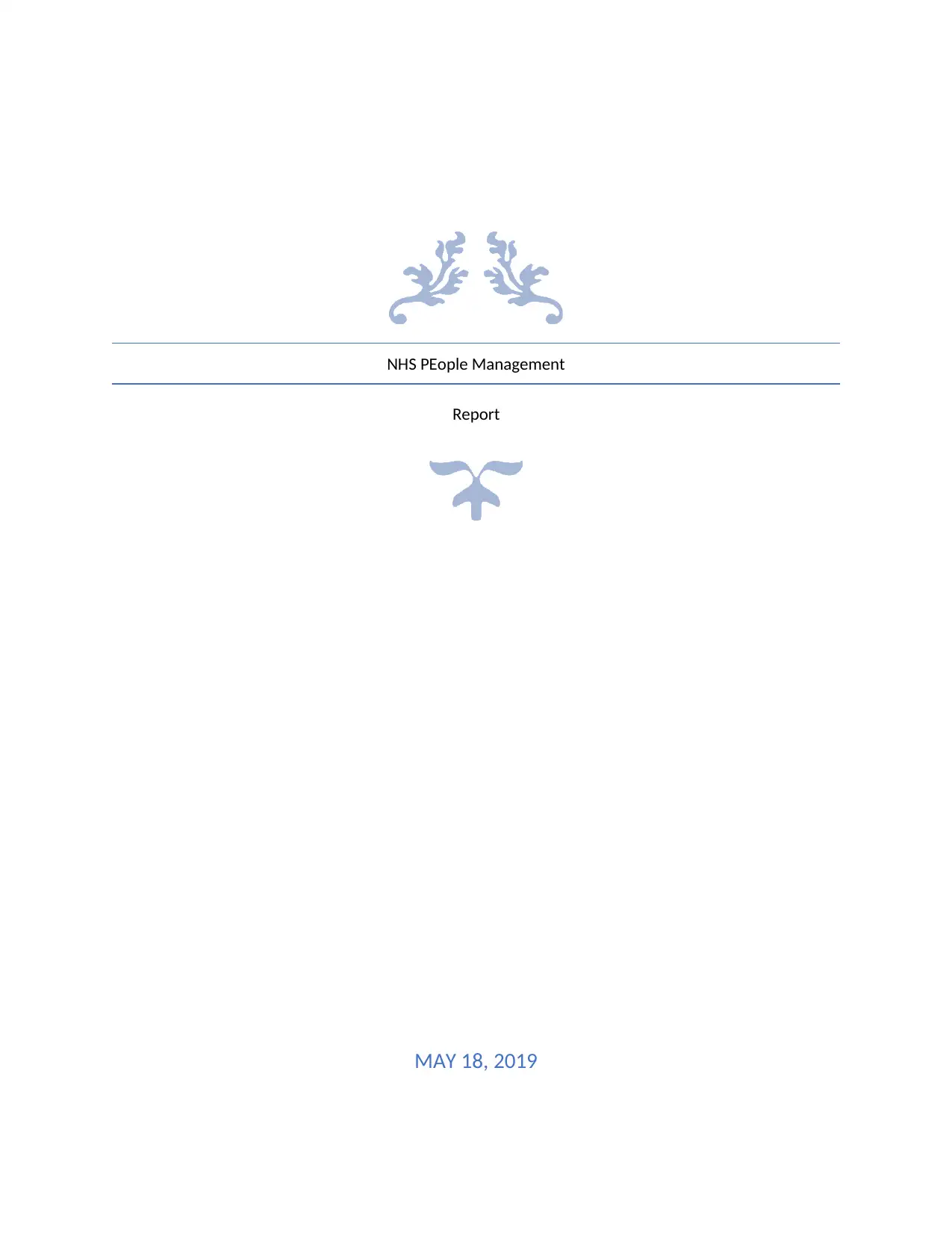
NHS PEople Management
Report
MAY 18, 2019
Report
MAY 18, 2019
Paraphrase This Document
Need a fresh take? Get an instant paraphrase of this document with our AI Paraphraser
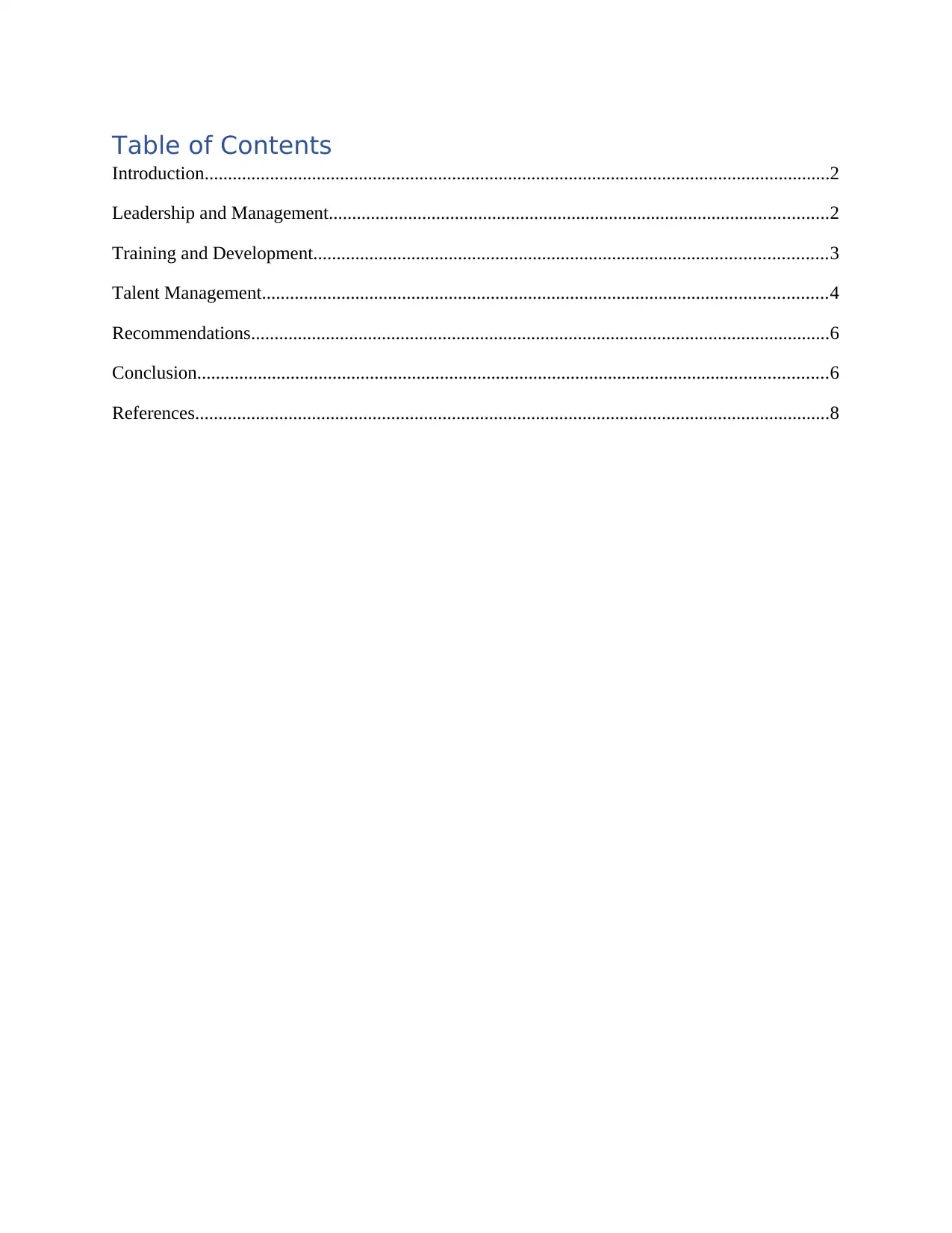
Table of Contents
Introduction......................................................................................................................................2
Leadership and Management...........................................................................................................2
Training and Development..............................................................................................................3
Talent Management.........................................................................................................................4
Recommendations............................................................................................................................6
Conclusion.......................................................................................................................................6
References........................................................................................................................................8
Introduction......................................................................................................................................2
Leadership and Management...........................................................................................................2
Training and Development..............................................................................................................3
Talent Management.........................................................................................................................4
Recommendations............................................................................................................................6
Conclusion.......................................................................................................................................6
References........................................................................................................................................8
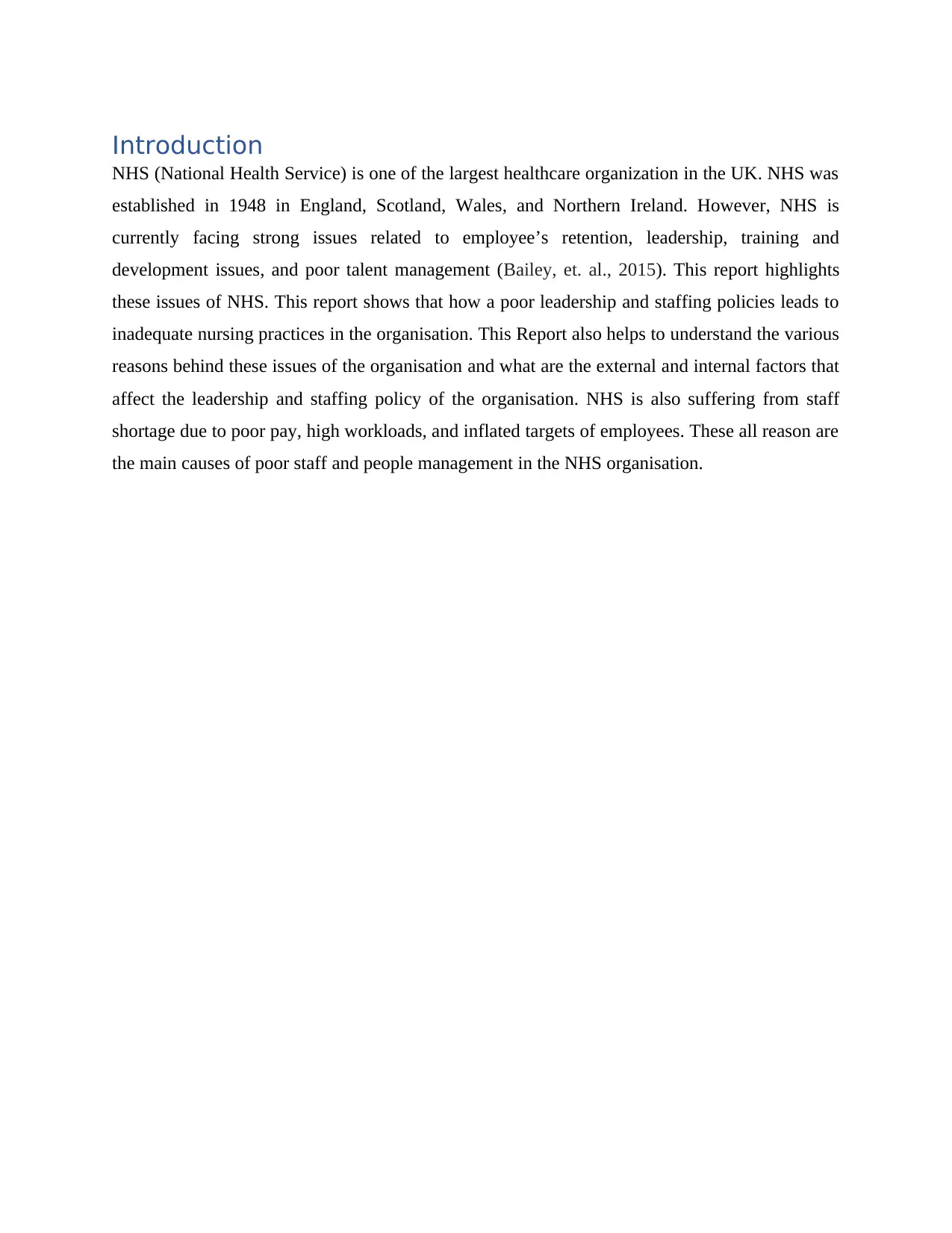
Introduction
NHS (National Health Service) is one of the largest healthcare organization in the UK. NHS was
established in 1948 in England, Scotland, Wales, and Northern Ireland. However, NHS is
currently facing strong issues related to employee’s retention, leadership, training and
development issues, and poor talent management (Bailey, et. al., 2015). This report highlights
these issues of NHS. This report shows that how a poor leadership and staffing policies leads to
inadequate nursing practices in the organisation. This Report also helps to understand the various
reasons behind these issues of the organisation and what are the external and internal factors that
affect the leadership and staffing policy of the organisation. NHS is also suffering from staff
shortage due to poor pay, high workloads, and inflated targets of employees. These all reason are
the main causes of poor staff and people management in the NHS organisation.
NHS (National Health Service) is one of the largest healthcare organization in the UK. NHS was
established in 1948 in England, Scotland, Wales, and Northern Ireland. However, NHS is
currently facing strong issues related to employee’s retention, leadership, training and
development issues, and poor talent management (Bailey, et. al., 2015). This report highlights
these issues of NHS. This report shows that how a poor leadership and staffing policies leads to
inadequate nursing practices in the organisation. This Report also helps to understand the various
reasons behind these issues of the organisation and what are the external and internal factors that
affect the leadership and staffing policy of the organisation. NHS is also suffering from staff
shortage due to poor pay, high workloads, and inflated targets of employees. These all reason are
the main causes of poor staff and people management in the NHS organisation.
⊘ This is a preview!⊘
Do you want full access?
Subscribe today to unlock all pages.

Trusted by 1+ million students worldwide
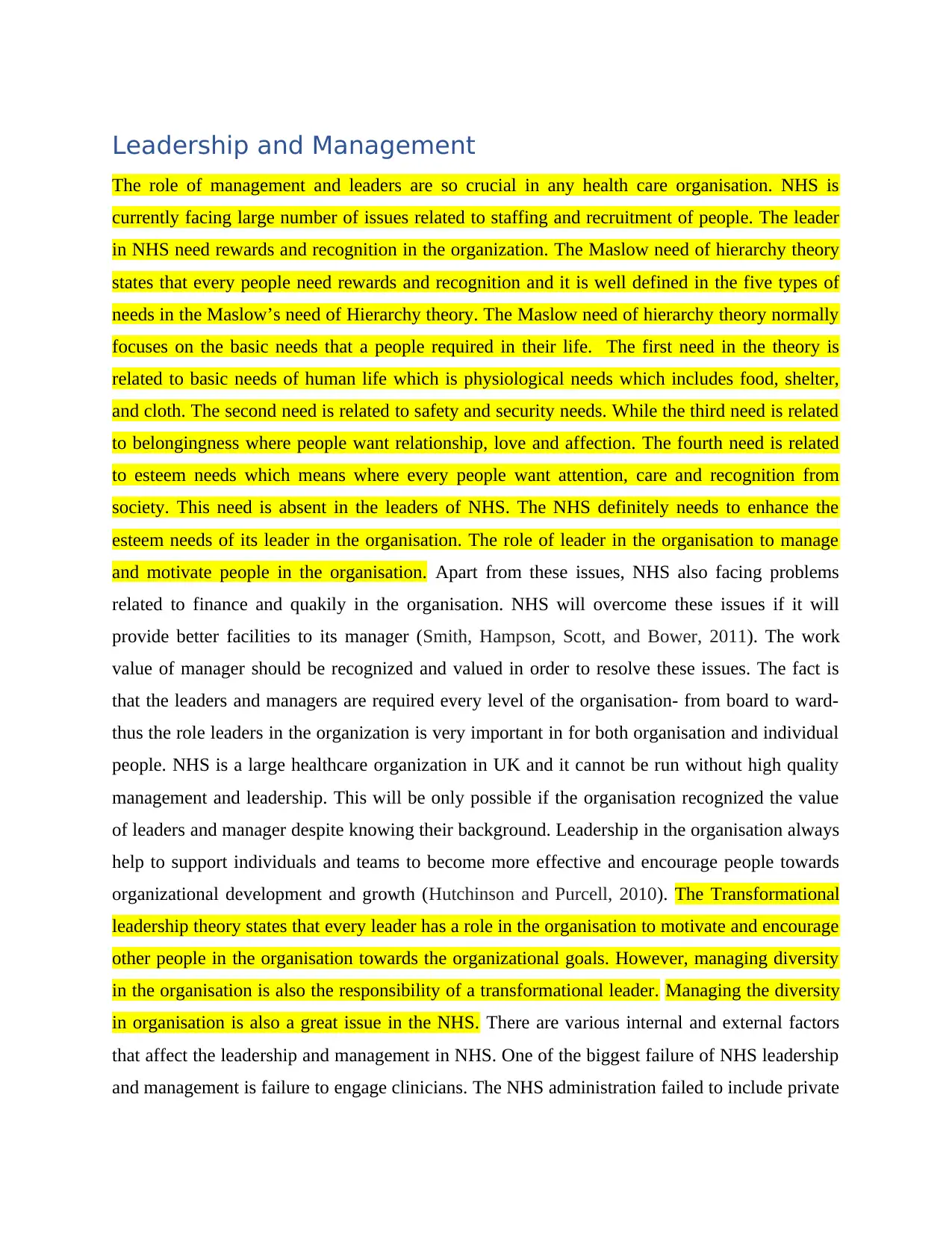
Leadership and Management
The role of management and leaders are so crucial in any health care organisation. NHS is
currently facing large number of issues related to staffing and recruitment of people. The leader
in NHS need rewards and recognition in the organization. The Maslow need of hierarchy theory
states that every people need rewards and recognition and it is well defined in the five types of
needs in the Maslow’s need of Hierarchy theory. The Maslow need of hierarchy theory normally
focuses on the basic needs that a people required in their life. The first need in the theory is
related to basic needs of human life which is physiological needs which includes food, shelter,
and cloth. The second need is related to safety and security needs. While the third need is related
to belongingness where people want relationship, love and affection. The fourth need is related
to esteem needs which means where every people want attention, care and recognition from
society. This need is absent in the leaders of NHS. The NHS definitely needs to enhance the
esteem needs of its leader in the organisation. The role of leader in the organisation to manage
and motivate people in the organisation. Apart from these issues, NHS also facing problems
related to finance and quakily in the organisation. NHS will overcome these issues if it will
provide better facilities to its manager (Smith, Hampson, Scott, and Bower, 2011). The work
value of manager should be recognized and valued in order to resolve these issues. The fact is
that the leaders and managers are required every level of the organisation- from board to ward-
thus the role leaders in the organization is very important in for both organisation and individual
people. NHS is a large healthcare organization in UK and it cannot be run without high quality
management and leadership. This will be only possible if the organisation recognized the value
of leaders and manager despite knowing their background. Leadership in the organisation always
help to support individuals and teams to become more effective and encourage people towards
organizational development and growth (Hutchinson and Purcell, 2010). The Transformational
leadership theory states that every leader has a role in the organisation to motivate and encourage
other people in the organisation towards the organizational goals. However, managing diversity
in the organisation is also the responsibility of a transformational leader. Managing the diversity
in organisation is also a great issue in the NHS. There are various internal and external factors
that affect the leadership and management in NHS. One of the biggest failure of NHS leadership
and management is failure to engage clinicians. The NHS administration failed to include private
The role of management and leaders are so crucial in any health care organisation. NHS is
currently facing large number of issues related to staffing and recruitment of people. The leader
in NHS need rewards and recognition in the organization. The Maslow need of hierarchy theory
states that every people need rewards and recognition and it is well defined in the five types of
needs in the Maslow’s need of Hierarchy theory. The Maslow need of hierarchy theory normally
focuses on the basic needs that a people required in their life. The first need in the theory is
related to basic needs of human life which is physiological needs which includes food, shelter,
and cloth. The second need is related to safety and security needs. While the third need is related
to belongingness where people want relationship, love and affection. The fourth need is related
to esteem needs which means where every people want attention, care and recognition from
society. This need is absent in the leaders of NHS. The NHS definitely needs to enhance the
esteem needs of its leader in the organisation. The role of leader in the organisation to manage
and motivate people in the organisation. Apart from these issues, NHS also facing problems
related to finance and quakily in the organisation. NHS will overcome these issues if it will
provide better facilities to its manager (Smith, Hampson, Scott, and Bower, 2011). The work
value of manager should be recognized and valued in order to resolve these issues. The fact is
that the leaders and managers are required every level of the organisation- from board to ward-
thus the role leaders in the organization is very important in for both organisation and individual
people. NHS is a large healthcare organization in UK and it cannot be run without high quality
management and leadership. This will be only possible if the organisation recognized the value
of leaders and manager despite knowing their background. Leadership in the organisation always
help to support individuals and teams to become more effective and encourage people towards
organizational development and growth (Hutchinson and Purcell, 2010). The Transformational
leadership theory states that every leader has a role in the organisation to motivate and encourage
other people in the organisation towards the organizational goals. However, managing diversity
in the organisation is also the responsibility of a transformational leader. Managing the diversity
in organisation is also a great issue in the NHS. There are various internal and external factors
that affect the leadership and management in NHS. One of the biggest failure of NHS leadership
and management is failure to engage clinicians. The NHS administration failed to include private
Paraphrase This Document
Need a fresh take? Get an instant paraphrase of this document with our AI Paraphraser
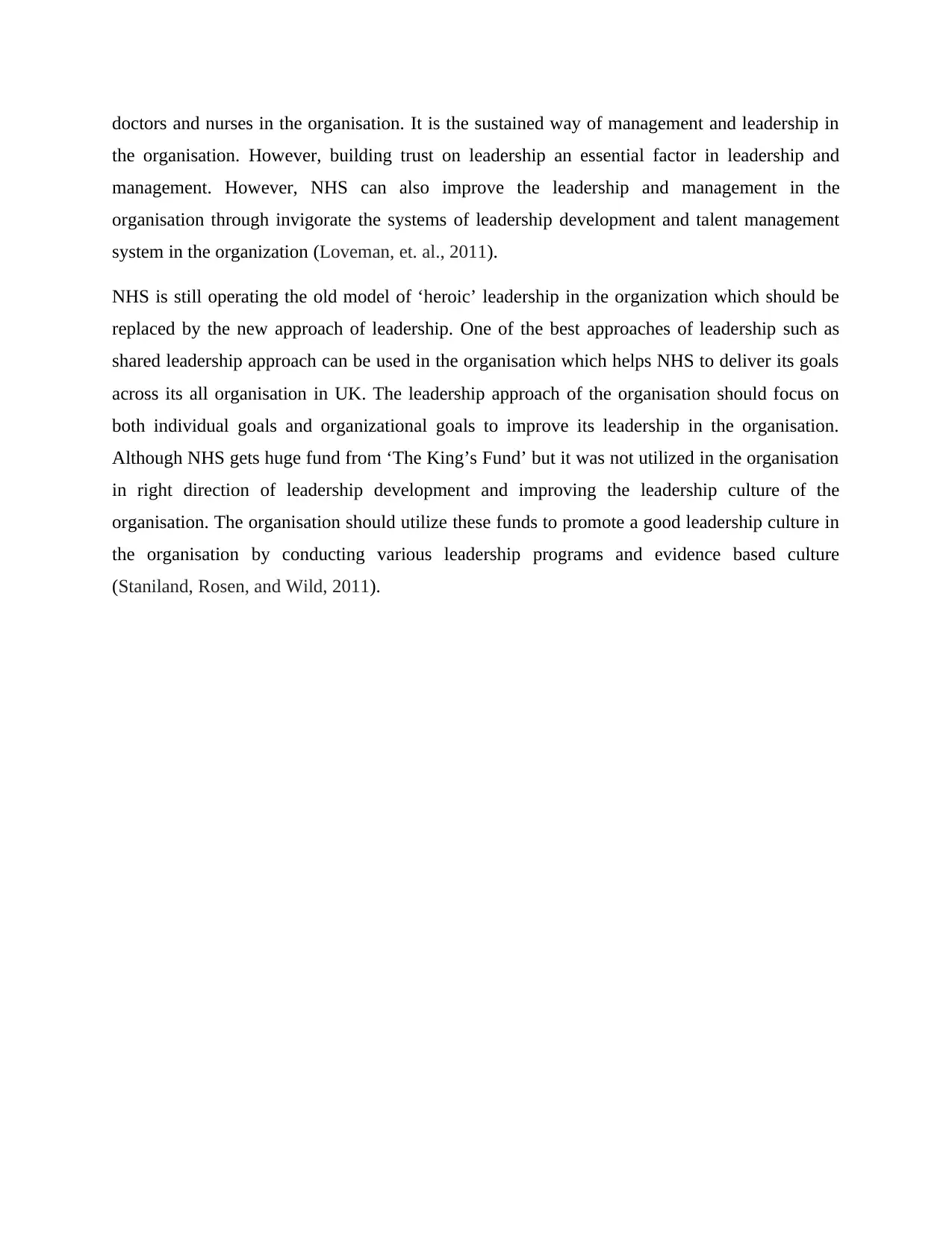
doctors and nurses in the organisation. It is the sustained way of management and leadership in
the organisation. However, building trust on leadership an essential factor in leadership and
management. However, NHS can also improve the leadership and management in the
organisation through invigorate the systems of leadership development and talent management
system in the organization (Loveman, et. al., 2011).
NHS is still operating the old model of ‘heroic’ leadership in the organization which should be
replaced by the new approach of leadership. One of the best approaches of leadership such as
shared leadership approach can be used in the organisation which helps NHS to deliver its goals
across its all organisation in UK. The leadership approach of the organisation should focus on
both individual goals and organizational goals to improve its leadership in the organisation.
Although NHS gets huge fund from ‘The King’s Fund’ but it was not utilized in the organisation
in right direction of leadership development and improving the leadership culture of the
organisation. The organisation should utilize these funds to promote a good leadership culture in
the organisation by conducting various leadership programs and evidence based culture
(Staniland, Rosen, and Wild, 2011).
the organisation. However, building trust on leadership an essential factor in leadership and
management. However, NHS can also improve the leadership and management in the
organisation through invigorate the systems of leadership development and talent management
system in the organization (Loveman, et. al., 2011).
NHS is still operating the old model of ‘heroic’ leadership in the organization which should be
replaced by the new approach of leadership. One of the best approaches of leadership such as
shared leadership approach can be used in the organisation which helps NHS to deliver its goals
across its all organisation in UK. The leadership approach of the organisation should focus on
both individual goals and organizational goals to improve its leadership in the organisation.
Although NHS gets huge fund from ‘The King’s Fund’ but it was not utilized in the organisation
in right direction of leadership development and improving the leadership culture of the
organisation. The organisation should utilize these funds to promote a good leadership culture in
the organisation by conducting various leadership programs and evidence based culture
(Staniland, Rosen, and Wild, 2011).
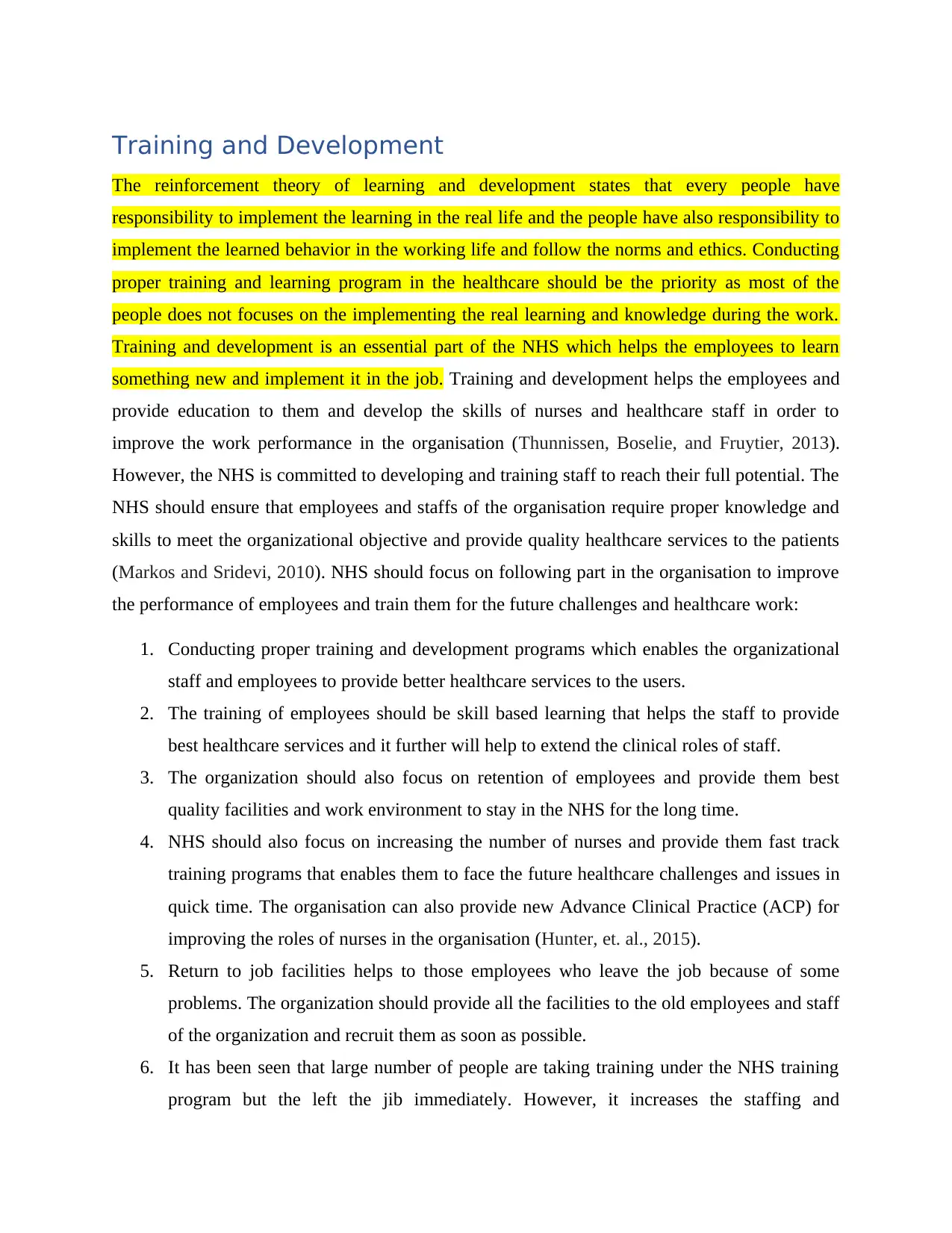
Training and Development
The reinforcement theory of learning and development states that every people have
responsibility to implement the learning in the real life and the people have also responsibility to
implement the learned behavior in the working life and follow the norms and ethics. Conducting
proper training and learning program in the healthcare should be the priority as most of the
people does not focuses on the implementing the real learning and knowledge during the work.
Training and development is an essential part of the NHS which helps the employees to learn
something new and implement it in the job. Training and development helps the employees and
provide education to them and develop the skills of nurses and healthcare staff in order to
improve the work performance in the organisation (Thunnissen, Boselie, and Fruytier, 2013).
However, the NHS is committed to developing and training staff to reach their full potential. The
NHS should ensure that employees and staffs of the organisation require proper knowledge and
skills to meet the organizational objective and provide quality healthcare services to the patients
(Markos and Sridevi, 2010). NHS should focus on following part in the organisation to improve
the performance of employees and train them for the future challenges and healthcare work:
1. Conducting proper training and development programs which enables the organizational
staff and employees to provide better healthcare services to the users.
2. The training of employees should be skill based learning that helps the staff to provide
best healthcare services and it further will help to extend the clinical roles of staff.
3. The organization should also focus on retention of employees and provide them best
quality facilities and work environment to stay in the NHS for the long time.
4. NHS should also focus on increasing the number of nurses and provide them fast track
training programs that enables them to face the future healthcare challenges and issues in
quick time. The organisation can also provide new Advance Clinical Practice (ACP) for
improving the roles of nurses in the organisation (Hunter, et. al., 2015).
5. Return to job facilities helps to those employees who leave the job because of some
problems. The organization should provide all the facilities to the old employees and staff
of the organization and recruit them as soon as possible.
6. It has been seen that large number of people are taking training under the NHS training
program but the left the jib immediately. However, it increases the staffing and
The reinforcement theory of learning and development states that every people have
responsibility to implement the learning in the real life and the people have also responsibility to
implement the learned behavior in the working life and follow the norms and ethics. Conducting
proper training and learning program in the healthcare should be the priority as most of the
people does not focuses on the implementing the real learning and knowledge during the work.
Training and development is an essential part of the NHS which helps the employees to learn
something new and implement it in the job. Training and development helps the employees and
provide education to them and develop the skills of nurses and healthcare staff in order to
improve the work performance in the organisation (Thunnissen, Boselie, and Fruytier, 2013).
However, the NHS is committed to developing and training staff to reach their full potential. The
NHS should ensure that employees and staffs of the organisation require proper knowledge and
skills to meet the organizational objective and provide quality healthcare services to the patients
(Markos and Sridevi, 2010). NHS should focus on following part in the organisation to improve
the performance of employees and train them for the future challenges and healthcare work:
1. Conducting proper training and development programs which enables the organizational
staff and employees to provide better healthcare services to the users.
2. The training of employees should be skill based learning that helps the staff to provide
best healthcare services and it further will help to extend the clinical roles of staff.
3. The organization should also focus on retention of employees and provide them best
quality facilities and work environment to stay in the NHS for the long time.
4. NHS should also focus on increasing the number of nurses and provide them fast track
training programs that enables them to face the future healthcare challenges and issues in
quick time. The organisation can also provide new Advance Clinical Practice (ACP) for
improving the roles of nurses in the organisation (Hunter, et. al., 2015).
5. Return to job facilities helps to those employees who leave the job because of some
problems. The organization should provide all the facilities to the old employees and staff
of the organization and recruit them as soon as possible.
6. It has been seen that large number of people are taking training under the NHS training
program but the left the jib immediately. However, it increases the staffing and
⊘ This is a preview!⊘
Do you want full access?
Subscribe today to unlock all pages.

Trusted by 1+ million students worldwide
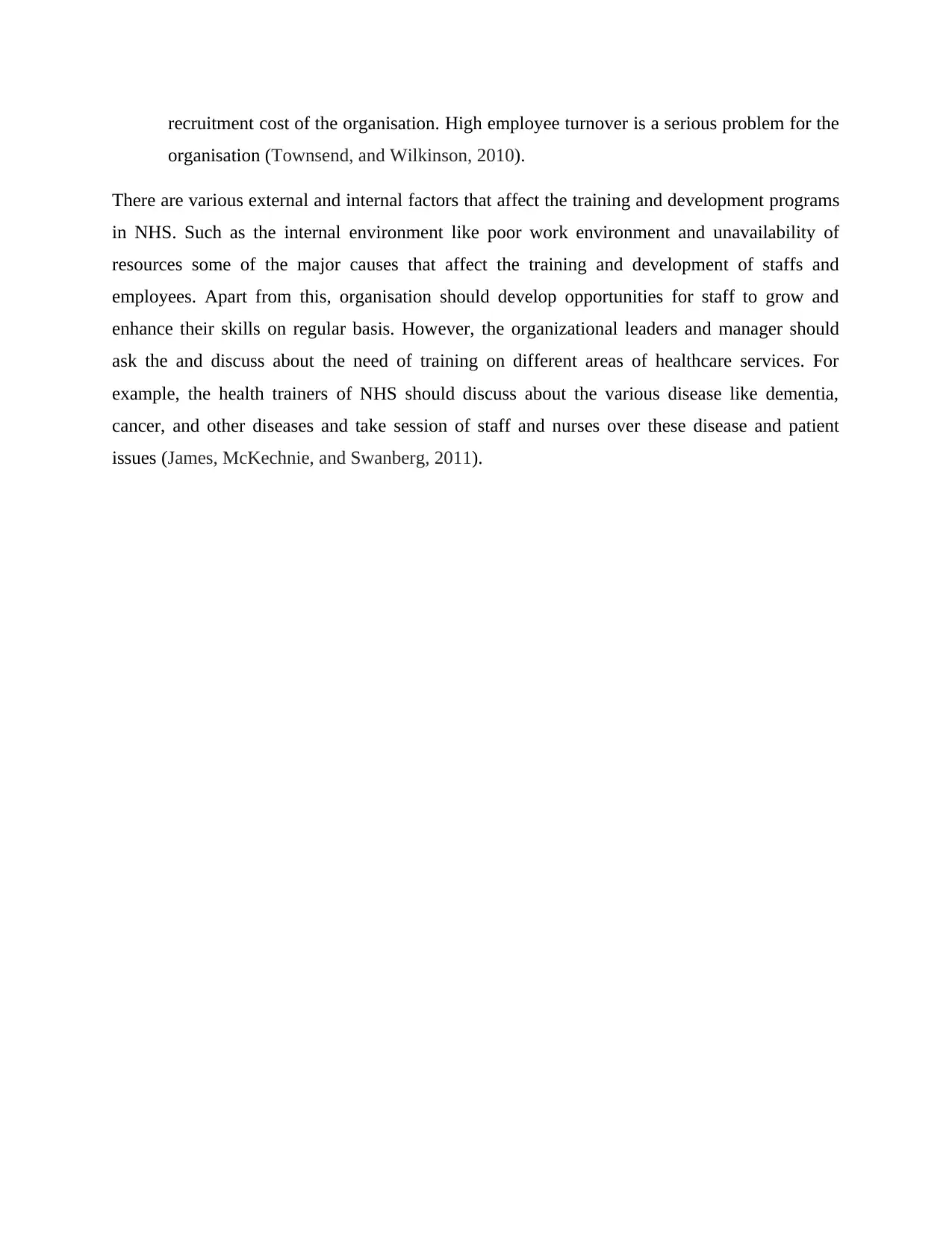
recruitment cost of the organisation. High employee turnover is a serious problem for the
organisation (Townsend, and Wilkinson, 2010).
There are various external and internal factors that affect the training and development programs
in NHS. Such as the internal environment like poor work environment and unavailability of
resources some of the major causes that affect the training and development of staffs and
employees. Apart from this, organisation should develop opportunities for staff to grow and
enhance their skills on regular basis. However, the organizational leaders and manager should
ask the and discuss about the need of training on different areas of healthcare services. For
example, the health trainers of NHS should discuss about the various disease like dementia,
cancer, and other diseases and take session of staff and nurses over these disease and patient
issues (James, McKechnie, and Swanberg, 2011).
organisation (Townsend, and Wilkinson, 2010).
There are various external and internal factors that affect the training and development programs
in NHS. Such as the internal environment like poor work environment and unavailability of
resources some of the major causes that affect the training and development of staffs and
employees. Apart from this, organisation should develop opportunities for staff to grow and
enhance their skills on regular basis. However, the organizational leaders and manager should
ask the and discuss about the need of training on different areas of healthcare services. For
example, the health trainers of NHS should discuss about the various disease like dementia,
cancer, and other diseases and take session of staff and nurses over these disease and patient
issues (James, McKechnie, and Swanberg, 2011).
Paraphrase This Document
Need a fresh take? Get an instant paraphrase of this document with our AI Paraphraser
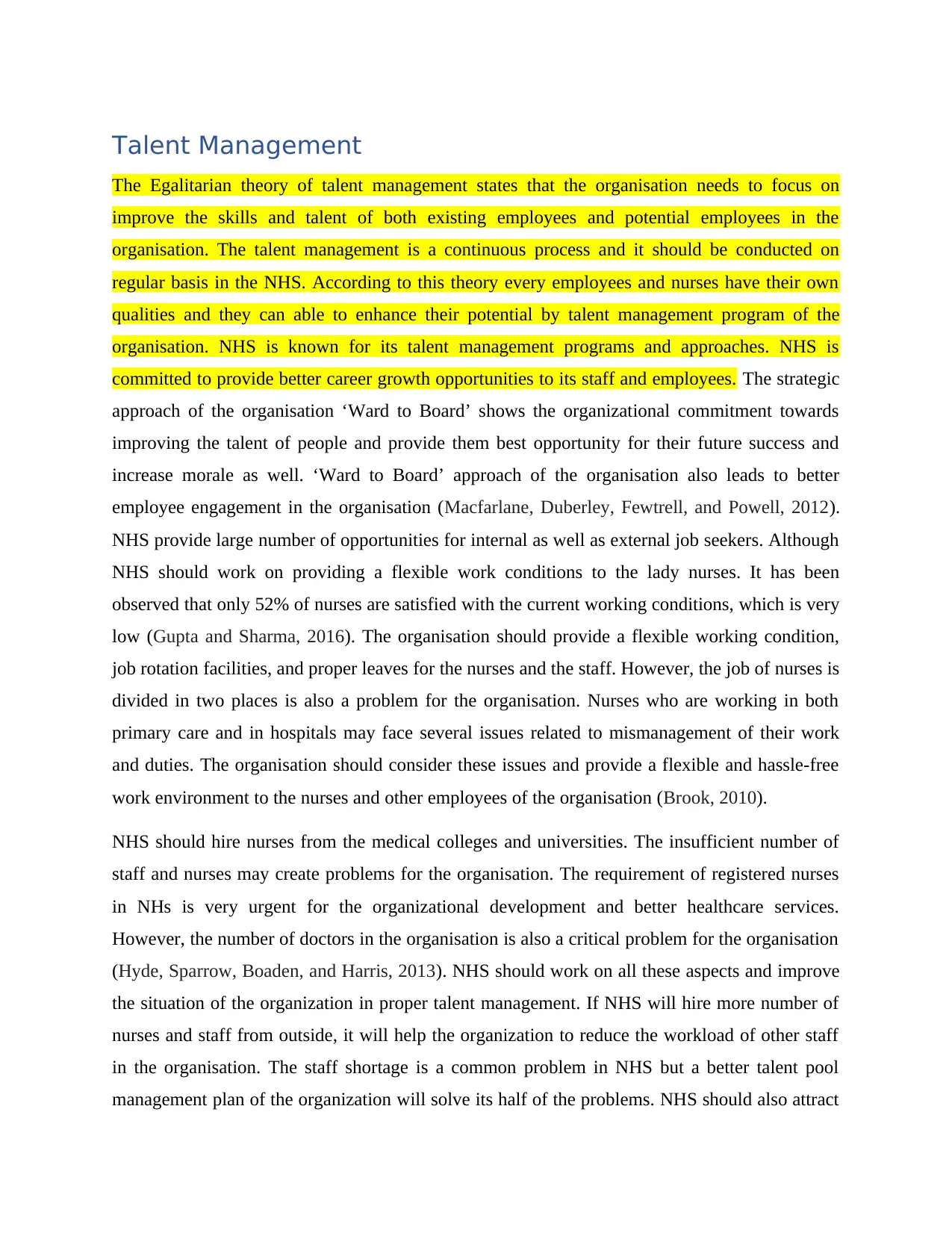
Talent Management
The Egalitarian theory of talent management states that the organisation needs to focus on
improve the skills and talent of both existing employees and potential employees in the
organisation. The talent management is a continuous process and it should be conducted on
regular basis in the NHS. According to this theory every employees and nurses have their own
qualities and they can able to enhance their potential by talent management program of the
organisation. NHS is known for its talent management programs and approaches. NHS is
committed to provide better career growth opportunities to its staff and employees. The strategic
approach of the organisation ‘Ward to Board’ shows the organizational commitment towards
improving the talent of people and provide them best opportunity for their future success and
increase morale as well. ‘Ward to Board’ approach of the organisation also leads to better
employee engagement in the organisation (Macfarlane, Duberley, Fewtrell, and Powell, 2012).
NHS provide large number of opportunities for internal as well as external job seekers. Although
NHS should work on providing a flexible work conditions to the lady nurses. It has been
observed that only 52% of nurses are satisfied with the current working conditions, which is very
low (Gupta and Sharma, 2016). The organisation should provide a flexible working condition,
job rotation facilities, and proper leaves for the nurses and the staff. However, the job of nurses is
divided in two places is also a problem for the organisation. Nurses who are working in both
primary care and in hospitals may face several issues related to mismanagement of their work
and duties. The organisation should consider these issues and provide a flexible and hassle-free
work environment to the nurses and other employees of the organisation (Brook, 2010).
NHS should hire nurses from the medical colleges and universities. The insufficient number of
staff and nurses may create problems for the organisation. The requirement of registered nurses
in NHs is very urgent for the organizational development and better healthcare services.
However, the number of doctors in the organisation is also a critical problem for the organisation
(Hyde, Sparrow, Boaden, and Harris, 2013). NHS should work on all these aspects and improve
the situation of the organization in proper talent management. If NHS will hire more number of
nurses and staff from outside, it will help the organization to reduce the workload of other staff
in the organisation. The staff shortage is a common problem in NHS but a better talent pool
management plan of the organization will solve its half of the problems. NHS should also attract
The Egalitarian theory of talent management states that the organisation needs to focus on
improve the skills and talent of both existing employees and potential employees in the
organisation. The talent management is a continuous process and it should be conducted on
regular basis in the NHS. According to this theory every employees and nurses have their own
qualities and they can able to enhance their potential by talent management program of the
organisation. NHS is known for its talent management programs and approaches. NHS is
committed to provide better career growth opportunities to its staff and employees. The strategic
approach of the organisation ‘Ward to Board’ shows the organizational commitment towards
improving the talent of people and provide them best opportunity for their future success and
increase morale as well. ‘Ward to Board’ approach of the organisation also leads to better
employee engagement in the organisation (Macfarlane, Duberley, Fewtrell, and Powell, 2012).
NHS provide large number of opportunities for internal as well as external job seekers. Although
NHS should work on providing a flexible work conditions to the lady nurses. It has been
observed that only 52% of nurses are satisfied with the current working conditions, which is very
low (Gupta and Sharma, 2016). The organisation should provide a flexible working condition,
job rotation facilities, and proper leaves for the nurses and the staff. However, the job of nurses is
divided in two places is also a problem for the organisation. Nurses who are working in both
primary care and in hospitals may face several issues related to mismanagement of their work
and duties. The organisation should consider these issues and provide a flexible and hassle-free
work environment to the nurses and other employees of the organisation (Brook, 2010).
NHS should hire nurses from the medical colleges and universities. The insufficient number of
staff and nurses may create problems for the organisation. The requirement of registered nurses
in NHs is very urgent for the organizational development and better healthcare services.
However, the number of doctors in the organisation is also a critical problem for the organisation
(Hyde, Sparrow, Boaden, and Harris, 2013). NHS should work on all these aspects and improve
the situation of the organization in proper talent management. If NHS will hire more number of
nurses and staff from outside, it will help the organization to reduce the workload of other staff
in the organisation. The staff shortage is a common problem in NHS but a better talent pool
management plan of the organization will solve its half of the problems. NHS should also attract
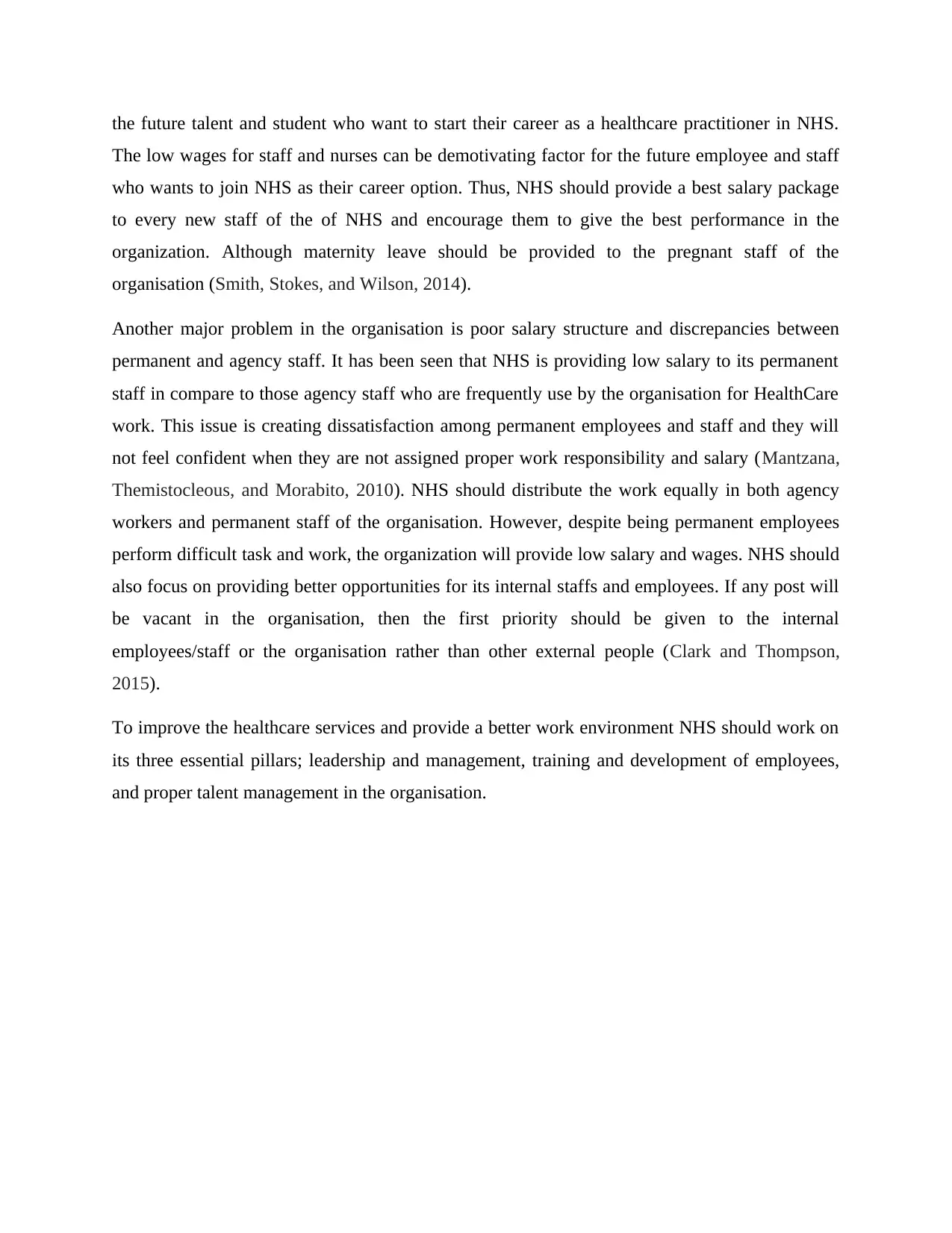
the future talent and student who want to start their career as a healthcare practitioner in NHS.
The low wages for staff and nurses can be demotivating factor for the future employee and staff
who wants to join NHS as their career option. Thus, NHS should provide a best salary package
to every new staff of the of NHS and encourage them to give the best performance in the
organization. Although maternity leave should be provided to the pregnant staff of the
organisation (Smith, Stokes, and Wilson, 2014).
Another major problem in the organisation is poor salary structure and discrepancies between
permanent and agency staff. It has been seen that NHS is providing low salary to its permanent
staff in compare to those agency staff who are frequently use by the organisation for HealthCare
work. This issue is creating dissatisfaction among permanent employees and staff and they will
not feel confident when they are not assigned proper work responsibility and salary (Mantzana,
Themistocleous, and Morabito, 2010). NHS should distribute the work equally in both agency
workers and permanent staff of the organisation. However, despite being permanent employees
perform difficult task and work, the organization will provide low salary and wages. NHS should
also focus on providing better opportunities for its internal staffs and employees. If any post will
be vacant in the organisation, then the first priority should be given to the internal
employees/staff or the organisation rather than other external people (Clark and Thompson,
2015).
To improve the healthcare services and provide a better work environment NHS should work on
its three essential pillars; leadership and management, training and development of employees,
and proper talent management in the organisation.
The low wages for staff and nurses can be demotivating factor for the future employee and staff
who wants to join NHS as their career option. Thus, NHS should provide a best salary package
to every new staff of the of NHS and encourage them to give the best performance in the
organization. Although maternity leave should be provided to the pregnant staff of the
organisation (Smith, Stokes, and Wilson, 2014).
Another major problem in the organisation is poor salary structure and discrepancies between
permanent and agency staff. It has been seen that NHS is providing low salary to its permanent
staff in compare to those agency staff who are frequently use by the organisation for HealthCare
work. This issue is creating dissatisfaction among permanent employees and staff and they will
not feel confident when they are not assigned proper work responsibility and salary (Mantzana,
Themistocleous, and Morabito, 2010). NHS should distribute the work equally in both agency
workers and permanent staff of the organisation. However, despite being permanent employees
perform difficult task and work, the organization will provide low salary and wages. NHS should
also focus on providing better opportunities for its internal staffs and employees. If any post will
be vacant in the organisation, then the first priority should be given to the internal
employees/staff or the organisation rather than other external people (Clark and Thompson,
2015).
To improve the healthcare services and provide a better work environment NHS should work on
its three essential pillars; leadership and management, training and development of employees,
and proper talent management in the organisation.
⊘ This is a preview!⊘
Do you want full access?
Subscribe today to unlock all pages.

Trusted by 1+ million students worldwide
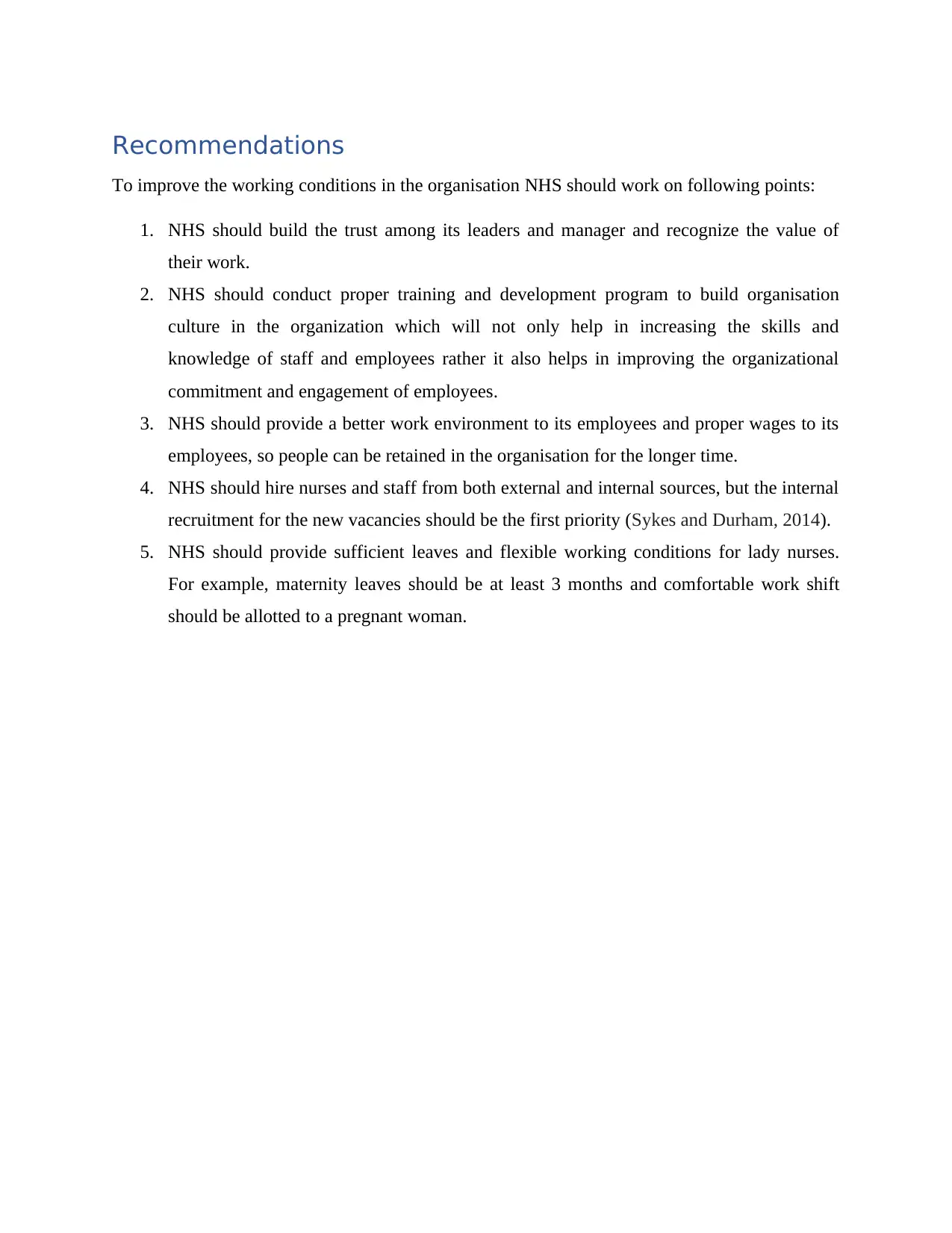
Recommendations
To improve the working conditions in the organisation NHS should work on following points:
1. NHS should build the trust among its leaders and manager and recognize the value of
their work.
2. NHS should conduct proper training and development program to build organisation
culture in the organization which will not only help in increasing the skills and
knowledge of staff and employees rather it also helps in improving the organizational
commitment and engagement of employees.
3. NHS should provide a better work environment to its employees and proper wages to its
employees, so people can be retained in the organisation for the longer time.
4. NHS should hire nurses and staff from both external and internal sources, but the internal
recruitment for the new vacancies should be the first priority (Sykes and Durham, 2014).
5. NHS should provide sufficient leaves and flexible working conditions for lady nurses.
For example, maternity leaves should be at least 3 months and comfortable work shift
should be allotted to a pregnant woman.
To improve the working conditions in the organisation NHS should work on following points:
1. NHS should build the trust among its leaders and manager and recognize the value of
their work.
2. NHS should conduct proper training and development program to build organisation
culture in the organization which will not only help in increasing the skills and
knowledge of staff and employees rather it also helps in improving the organizational
commitment and engagement of employees.
3. NHS should provide a better work environment to its employees and proper wages to its
employees, so people can be retained in the organisation for the longer time.
4. NHS should hire nurses and staff from both external and internal sources, but the internal
recruitment for the new vacancies should be the first priority (Sykes and Durham, 2014).
5. NHS should provide sufficient leaves and flexible working conditions for lady nurses.
For example, maternity leaves should be at least 3 months and comfortable work shift
should be allotted to a pregnant woman.
Paraphrase This Document
Need a fresh take? Get an instant paraphrase of this document with our AI Paraphraser
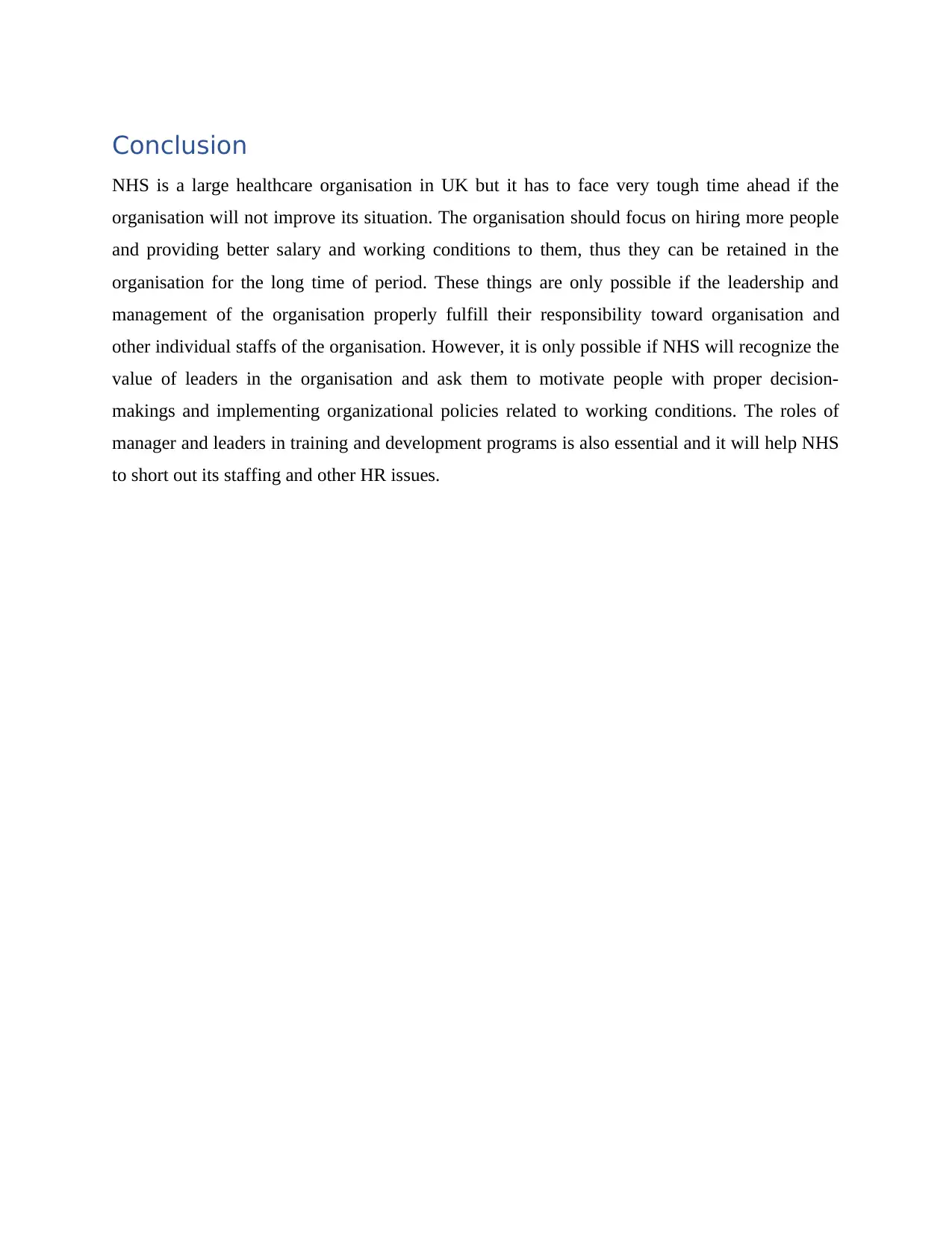
Conclusion
NHS is a large healthcare organisation in UK but it has to face very tough time ahead if the
organisation will not improve its situation. The organisation should focus on hiring more people
and providing better salary and working conditions to them, thus they can be retained in the
organisation for the long time of period. These things are only possible if the leadership and
management of the organisation properly fulfill their responsibility toward organisation and
other individual staffs of the organisation. However, it is only possible if NHS will recognize the
value of leaders in the organisation and ask them to motivate people with proper decision-
makings and implementing organizational policies related to working conditions. The roles of
manager and leaders in training and development programs is also essential and it will help NHS
to short out its staffing and other HR issues.
NHS is a large healthcare organisation in UK but it has to face very tough time ahead if the
organisation will not improve its situation. The organisation should focus on hiring more people
and providing better salary and working conditions to them, thus they can be retained in the
organisation for the long time of period. These things are only possible if the leadership and
management of the organisation properly fulfill their responsibility toward organisation and
other individual staffs of the organisation. However, it is only possible if NHS will recognize the
value of leaders in the organisation and ask them to motivate people with proper decision-
makings and implementing organizational policies related to working conditions. The roles of
manager and leaders in training and development programs is also essential and it will help NHS
to short out its staffing and other HR issues.
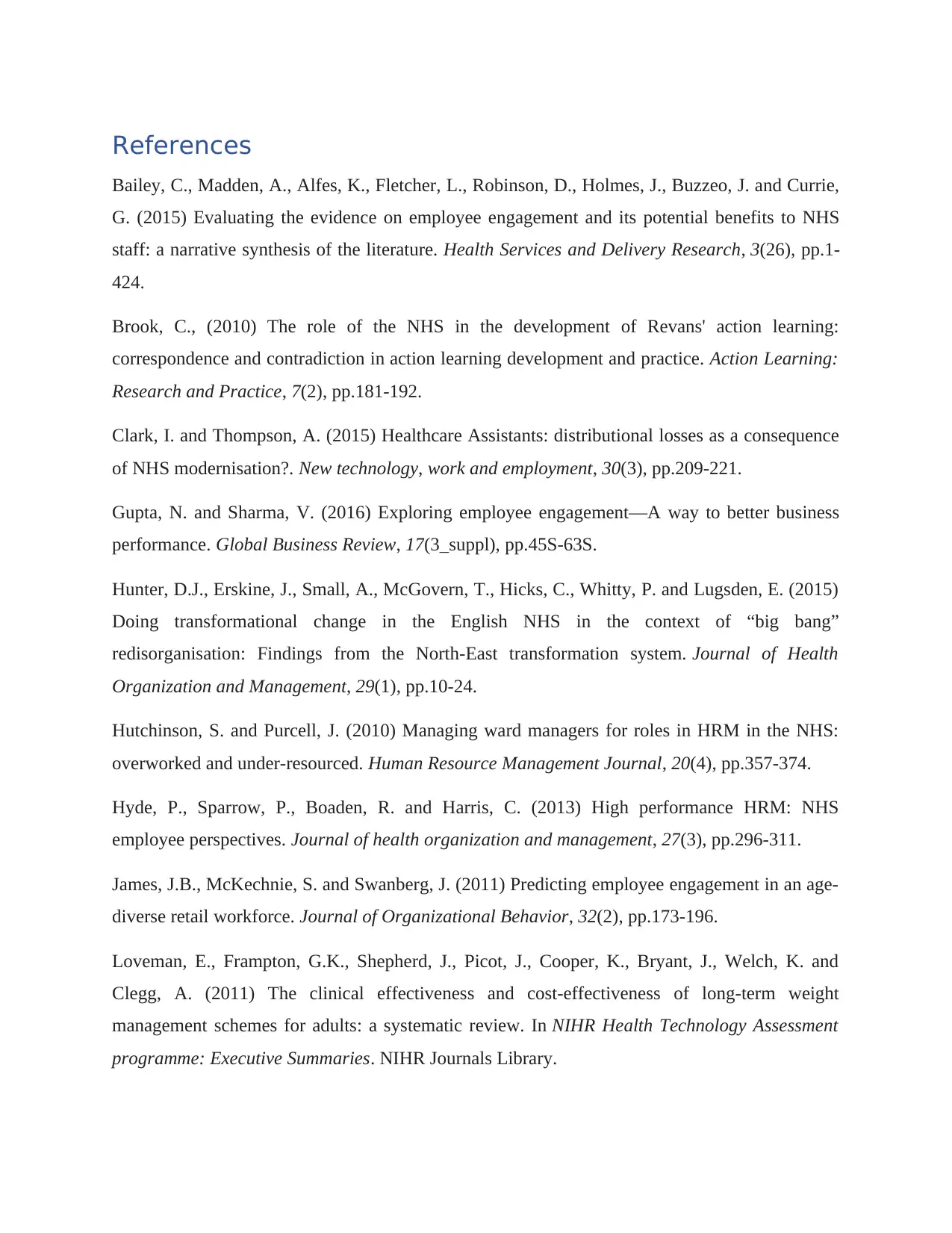
References
Bailey, C., Madden, A., Alfes, K., Fletcher, L., Robinson, D., Holmes, J., Buzzeo, J. and Currie,
G. (2015) Evaluating the evidence on employee engagement and its potential benefits to NHS
staff: a narrative synthesis of the literature. Health Services and Delivery Research, 3(26), pp.1-
424.
Brook, C., (2010) The role of the NHS in the development of Revans' action learning:
correspondence and contradiction in action learning development and practice. Action Learning:
Research and Practice, 7(2), pp.181-192.
Clark, I. and Thompson, A. (2015) Healthcare Assistants: distributional losses as a consequence
of NHS modernisation?. New technology, work and employment, 30(3), pp.209-221.
Gupta, N. and Sharma, V. (2016) Exploring employee engagement—A way to better business
performance. Global Business Review, 17(3_suppl), pp.45S-63S.
Hunter, D.J., Erskine, J., Small, A., McGovern, T., Hicks, C., Whitty, P. and Lugsden, E. (2015)
Doing transformational change in the English NHS in the context of “big bang”
redisorganisation: Findings from the North-East transformation system. Journal of Health
Organization and Management, 29(1), pp.10-24.
Hutchinson, S. and Purcell, J. (2010) Managing ward managers for roles in HRM in the NHS:
overworked and under‐resourced. Human Resource Management Journal, 20(4), pp.357-374.
Hyde, P., Sparrow, P., Boaden, R. and Harris, C. (2013) High performance HRM: NHS
employee perspectives. Journal of health organization and management, 27(3), pp.296-311.
James, J.B., McKechnie, S. and Swanberg, J. (2011) Predicting employee engagement in an age‐
diverse retail workforce. Journal of Organizational Behavior, 32(2), pp.173-196.
Loveman, E., Frampton, G.K., Shepherd, J., Picot, J., Cooper, K., Bryant, J., Welch, K. and
Clegg, A. (2011) The clinical effectiveness and cost-effectiveness of long-term weight
management schemes for adults: a systematic review. In NIHR Health Technology Assessment
programme: Executive Summaries. NIHR Journals Library.
Bailey, C., Madden, A., Alfes, K., Fletcher, L., Robinson, D., Holmes, J., Buzzeo, J. and Currie,
G. (2015) Evaluating the evidence on employee engagement and its potential benefits to NHS
staff: a narrative synthesis of the literature. Health Services and Delivery Research, 3(26), pp.1-
424.
Brook, C., (2010) The role of the NHS in the development of Revans' action learning:
correspondence and contradiction in action learning development and practice. Action Learning:
Research and Practice, 7(2), pp.181-192.
Clark, I. and Thompson, A. (2015) Healthcare Assistants: distributional losses as a consequence
of NHS modernisation?. New technology, work and employment, 30(3), pp.209-221.
Gupta, N. and Sharma, V. (2016) Exploring employee engagement—A way to better business
performance. Global Business Review, 17(3_suppl), pp.45S-63S.
Hunter, D.J., Erskine, J., Small, A., McGovern, T., Hicks, C., Whitty, P. and Lugsden, E. (2015)
Doing transformational change in the English NHS in the context of “big bang”
redisorganisation: Findings from the North-East transformation system. Journal of Health
Organization and Management, 29(1), pp.10-24.
Hutchinson, S. and Purcell, J. (2010) Managing ward managers for roles in HRM in the NHS:
overworked and under‐resourced. Human Resource Management Journal, 20(4), pp.357-374.
Hyde, P., Sparrow, P., Boaden, R. and Harris, C. (2013) High performance HRM: NHS
employee perspectives. Journal of health organization and management, 27(3), pp.296-311.
James, J.B., McKechnie, S. and Swanberg, J. (2011) Predicting employee engagement in an age‐
diverse retail workforce. Journal of Organizational Behavior, 32(2), pp.173-196.
Loveman, E., Frampton, G.K., Shepherd, J., Picot, J., Cooper, K., Bryant, J., Welch, K. and
Clegg, A. (2011) The clinical effectiveness and cost-effectiveness of long-term weight
management schemes for adults: a systematic review. In NIHR Health Technology Assessment
programme: Executive Summaries. NIHR Journals Library.
⊘ This is a preview!⊘
Do you want full access?
Subscribe today to unlock all pages.

Trusted by 1+ million students worldwide
1 out of 13
Related Documents
Your All-in-One AI-Powered Toolkit for Academic Success.
+13062052269
info@desklib.com
Available 24*7 on WhatsApp / Email
![[object Object]](/_next/static/media/star-bottom.7253800d.svg)
Unlock your academic potential
Copyright © 2020–2026 A2Z Services. All Rights Reserved. Developed and managed by ZUCOL.




